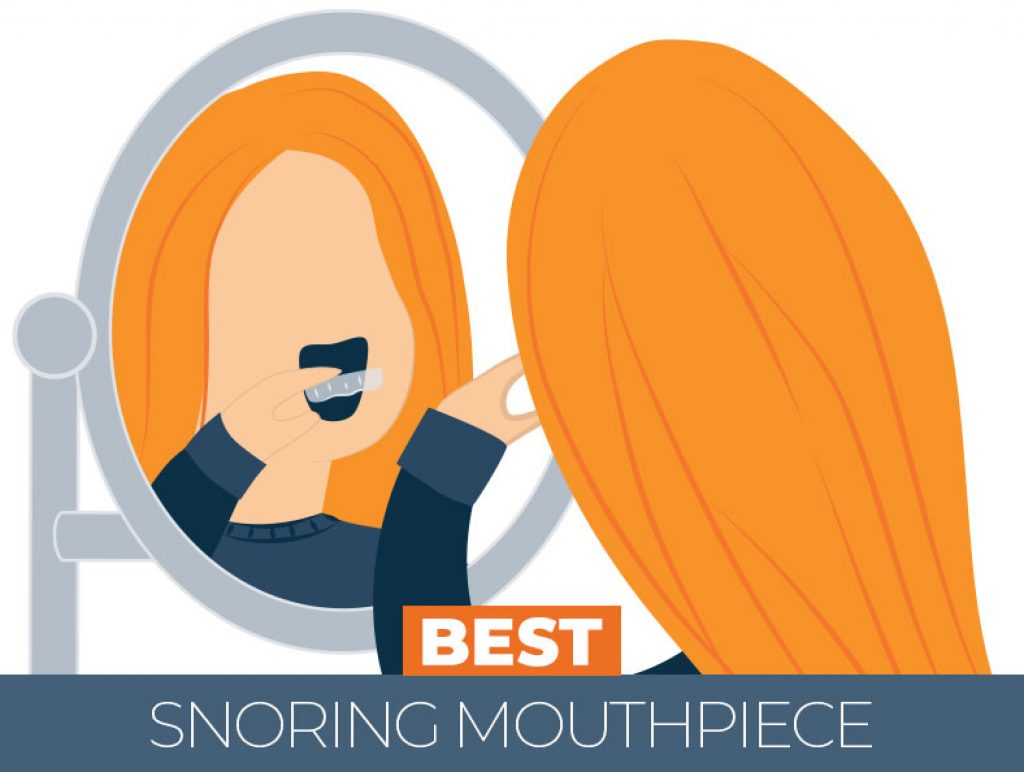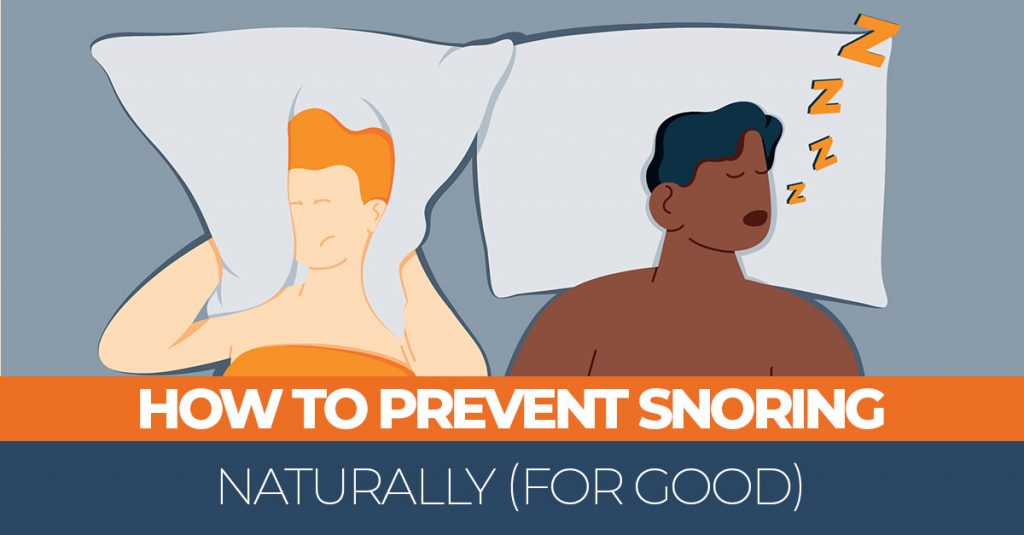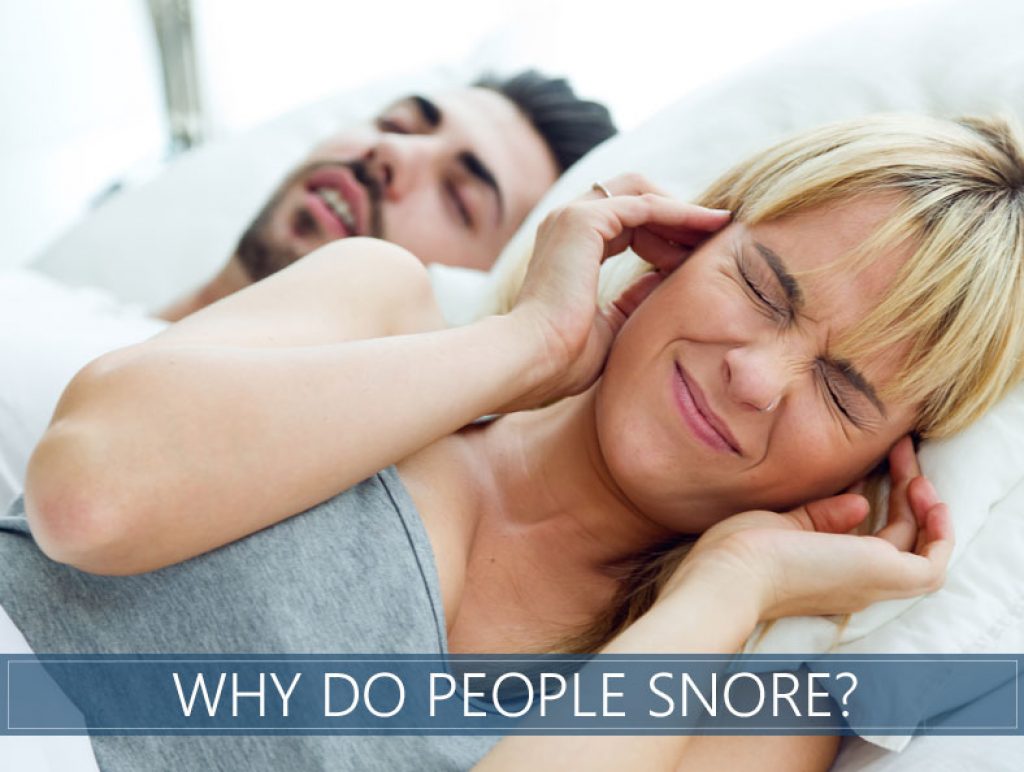Snoring is something that we’ve all encountered in some way or another; whether we occasionally snore ourselves or we’re disrupted by somebody else who does. According to Yale Medicine, as many as 90 million Americans1 snore at least occasionally, while about 37 million snore more regularly.
As disruptive as snoring can be for those around us, snoring is often harmless, but this depends on the underlying cause. For example, when sleep apnea is the cause, it could be dangerous if left untreated.
In this article, we’ll go over the different causes of snoring, when it may be a problem, and how you can fix it.
What Is Snoring?
When we go to sleep, the tissues in the back of our throat and mouth naturally relax, the tongue slips slightly backward, and our airway narrows. This is true for everybody, but for those who snore, the airway narrows so much that air can’t flow through properly. This causes the loose throat muscles to vibrate, which is what makes that harsh, noisy, rattling sound.1
According to the Mayo Clinic2, nearly everyone snores at some time or another, but some people snore chronically, and sometimes, it can point to a much more serious issue.
What Causes Snoring?
- Sleeping on your back – As mentioned, when we sleep, the muscles in the back of the mouth and throat relax, and this includes the tongue. When sleeping on your back, gravity allows for the relaxed tongue to collapse toward the back of the throat, which can block the airway, leading to snoring or even sleep apnea in some people.1
- Excess weight – When you have excess weight, it is not simply in one area of the body but distributed. One area where fat can gather is in the neck, which can press into the airway and cause it to narrow.1 This is especially true for men3, who tend to store fat in the abdomen, torso, and neck more than (premenopausal) women do.
Carrying excess weight can also create a vicious cycle when it comes to snoring and sleep. The more weight you carry, the more likely it is you’ll snore4. If snoring is bad enough that it disrupts your sleep, it is more likely that you’ll gain weight5.
- Alcohol – Alcohol further relaxes the muscles in the throat, which increases the likelihood of snoring.2 Studies6 also show that alcohol has a negative impact on overall sleep quality, so try to avoid drinking alcohol in the hours before bedtime to improve both snoring and sleep quality.
- Weakened muscle tone – A weakened muscle tone in the back of the throat can be a natural result of aging, however, it can also be caused by alcohol and other sedative medications, like opioids.1 The throat muscles can also be weakened by certain conditions7 like Parkinson’s disease, cerebral palsy, stroke, or certain head injuries.
Whatever the reason, these weakened throat muscles can make it more likely the airway will narrow enough to cause snoring.
- Certain medications – Medications that further relax the muscles in the throat can worsen or cause snoring. The most common group of these medications is benzodiazepines8, which are prescribed for anxiety and sometimes for insomnia, but they can actually cause or worsen snoring. Some popular examples of these medications include Valium, Klonopin, Ativan, and Xanax.8
- Pregnancy – Pregnancy not only causes weight gain, which can lead to snoring in and of itself, but pregnancy hormones also create a swelling of the nasal tissue. This added congestion can be particularly bad during the third trimester when hormone levels and weight are at their highest.1
- Anatomy – Certain anatomical issues can cause snoring. For example, a crooked nasal septum, or deviated septum9, can impact your ability to breathe through the nose.
Some people can also have a long palate or uvula, which is the “dangly thing” at the back of the throat. If it is too long, the opening between the throat and nose will be narrowed, which can negatively impact breathing, especially during sleep .1
- Nasal congestion – Nasal congestion, no matter what causes it, makes it more difficult to breathe and increases the likelihood of snoring.1
Snoring and Sleep Apnea
Most of the causes we’ve just discussed can not only increase your risk of snoring, but they can also increase your risk of sleep apnea.
Sleep apnea10 is a sleep disorder in which the breathing starts and stops repeatedly throughout the night. Just like with snoring, this happens during sleep when the throat muscles relax.
People who simply snore are still getting enough oxygen. Those with sleep apnea, however, experience such an extreme narrowing of the airway that they cannot get enough oxygen. This causes a drop in their blood oxygen levels, which alerts the brain to wake up to breathe properly. Oftentimes, these awakenings are so brief that you don’t remember them, but they still greatly impact your quality of rest.10
One of the most common symptoms of sleep apnea is snoring, though not everybody who snores has sleep apnea. Aside from snoring, symptoms of sleep apnea include noticeable episodes of paused breathing during the night (noticed by somebody else), gasping for air during sleep, waking up with a dry mouth, morning headaches, feeling unrested after enough sleep, insomnia, irritability, and difficulty paying attention during the day.10
Is Snoring Unhealthy?
Snoring in and of itself is not unhealthy, but as mentioned, it can point to something more serious like sleep apnea. Snoring might also be an indication that you need to lose weight or make other lifestyle changes so that the issue doesn’t get worse.
If you are a senior looking for a snoring friendly mattress, check out our Best Mattresses for Seniors.
When Should I Talk to My Doctor About Snoring?
Experts recommend you speak to your doctor if you snore regularly, as this can indicate something more serious like sleep apnea1 This is particularly important if your snoring is accompanied by weight gain, changes in memory, an inability to concentrate, morning headaches, or feeling tired in the morning or during the day.1
If you sleep next to somebody and your snoring is impacting their sleep, this is also a good reason to consult your doctor as they may be able to help.
Snoring Treatments
The treatment that will work for you will depend on what is causing your snoring in the first place. Below we’ll go over some of the most common treatment options for snoring, stemming from a variety of causes.
Changes to Your Lifestyle
There are a variety of lifestyle changes you can make to improve your snoring. To start, if you are a back sleeper, you might try sleeping on your side11. This should help open up your airway to reduce snoring. If you just can’t sleep in this position, you can also try a more elevated pillow, which should reduce airway collapsibility as well.11
If this doesn’t help, you may need to take further steps. For example, try avoiding alcohol for a week or so and see if this helps. If you tend to take sedatives like opioids, you may ask your doctor about safely coming off of them or changing your dose, so that you’re not taking any before bed.
If you are overweight or obese, your doctor might recommend making certain changes in diet and exercise to help you lose weight, which could curb your snoring.
For those who are congested and snoring, treating the congestion could help. This might include taking an allergy medication or sleeping more upright to help your sinuses drain.
For more relief, consider browsing the best beds for snoring.
Mouth-Strengthening Exercises
Mouth-strengthening exercises, also known as “myofunctional therapy,” or “oropharyngeal exercises,” have been shown to reduce snoring12 and even sleep apnea13. These exercises work by improving muscle strength in the mouth, face, and throat, and help encourage proper tongue posture and breathing. If your doctor thinks you might benefit from these exercises, you might be referred to a sleep specialist, dentist, or speech pathologist.
Oral Appliance
Certain oral appliances can help reduce snoring by keeping the jaw in a better position to improve airflow.11 These can be custom-made for you, which usually costs more, or you can buy pre-made ones.
Nasal Strips
Some people find that nasal strips – flexible bands that adhere to the outside of your nose – help with snoring. These work by slightly opening up the nasal passages.11
CPAP Device
If you have sleep apnea in addition to your snoring, your doctor may recommend a continuous positive airway pressure (CPAP) device. With this form of treatment, you wear a mask over your nose and/or mouth and a machine delivers a set stream of air pressure to keep your airway open when you sleep.1
Surgery
If none of the treatments listed above help with your snoring, your doctor may recommend surgery. There are various types of surgeries to treat snoring, but according to Yale Medicine, the four most common are:
- Tonsillectomies and adenoidectomies – If you have enlarged tonsils or adenoids, removing them may help with snoring or sleep apnea.1
- Thermal ablation – Thermal ablation is done to reduce the amount of tissue in the throat and mouth area to create a more open airway. Ablation methods can consist of bipolar cautery, laser, and radiofrequency.1
- Hypoglossal nerve stimulation – This treatment is one of the newest and is only done to treat snoring if it is linked to sleep apnea. Here, surgeons implant a pacemaker-like device with a sensor that detects when you stop breathing at night. The device then stimulates the muscles of the tongue to move out of the airway when you inhale.1
- Stiffening the soft palate – In this procedure, the soft palate (the soft area at the back of the mouth) is either injected or held up by an intersection of rods, making the soft palate stiff. This can reduce the sound of loud snoring.1
Frequently Asked Questions About Snoring
What is the main reason for snoring?
Occasional snoring is commonly caused by alcohol consumption or nasal congestion due to allergies or a cold. More regular snoring can be caused by the anatomy of the mouth, throat, and sinuses, excess weight, or a sleep disorder called sleep apnea.2
How can I stop my snoring?
If you snore loudly or regularly, you should consult your doctor as it could point to a more serious underlying condition like sleep apnea. To stop occasional snoring, you can try sleeping on your side, increasing the height of your pillow, avoiding alcohol or other sedatives in the evening, or clearing out any congestion. If that doesn’t work, you might try nasal strips, oral appliances, a CPAP machine, mouth-strengthening exercises, or as a last resort, surgery.1
Does snoring always mean I have sleep apnea?
Snoring does not always mean you have sleep apnea. If your snoring is accompanied by noticeable pauses in breathing, waking up gasping for air, insomnia, feeling unrested, morning headaches, or morning dry mouth, it may mean that you have sleep apnea.10
If you have any of these symptoms in addition to snoring you should consult a doctor.
SNoring
Featured Articles

Natalie Grigson
Writer
About Author
Natalie is a content writer for Sleep Advisor with a deep passion for all things health and a fascination with the mysterious activity that is sleep. Outside of writing about sleep, she is a bestselling author, improviser, and creative writing teacher based out of Austin.
Combination Sleeper
- 1. “Snoring”. Yale Medicine. Webpage accessed October 30, 2024. –
- 2. “Snoring”. Mayo Clinic. Last modified December 22, 2017. –
- 3. Nauli, Andromeda M., Matin, Sahar. “Why Do Men Accumulate Abdominal Visceral Fat?”. National Library of Medicine. 2019. –
- 4. Shukla, Amitabh Das., et al. “Does ‘weight reduction’ help all adult snorers?”. Lung India. 2013. –
- 5. Salamon, Maureen. “Snooze more, eat less? Sleep deprivation may hamper weight control”. Harvard Health Publishing. 2022. –
- 6. Thakkar, Mahesh M., Sharma, Rishi., Sahota, Pradeep. “Alcohol disrupts sleep homeostasis”. Alcohol. 2015. –
- 7. “Dysphagia”. National Institute on Deafness and Other Communication Disorders. Last modified March 6, 2017. –
- 8. “How to silence snoring”. Harvard Health Publishing. 2020. –
- 9. “Deviated septum”. Mayo Clinic. Last modified September 14, 2021. –
- 10. “Sleep Apnea”. Mayo Clinic. Last modified April 6, 2024. –
- 11. “Snoring”. Cleveland Clinic. Webpage accessed October 30, 2024. –
- 12. Camacho, Macario., et al. “Oropharyngeal and tongue exercises (myofunctional therapy) for snoring: a systematic review and meta-analysis”. European Archives of Oto-Rhino-Laryngology. 2017. –
- 13. Camacho, Macario., et al. “Myofunctional Therapy to Treat Obstructive Sleep Apnea: A Systematic Review and Meta-analysis”. Sleep. 2015. –



